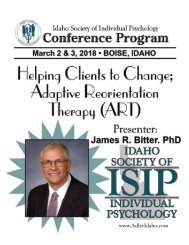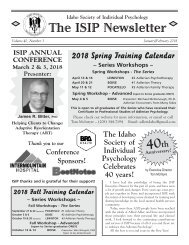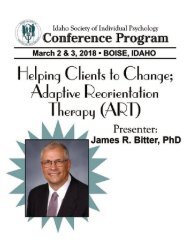November - December 2019
Create successful ePaper yourself
Turn your PDF publications into a flip-book with our unique Google optimized e-Paper software.
Maybell Memos
The Art of Encouragement
in Therapy
Altogether in every step of treatment we must not deviate from the path of encouragement.
(Alfred Adler in The Individual Psychology of Alfred Adler, page 342)
Essentially Individual Psychology is a method of limitless encouragement.
(Alfred Adler from Individual Psychology, page 27)
Encouragement means... to restore the client’s faith in himself, the realization of his strength and
ability, and the belief in his own dignity and worth.
(Rudolf Dreikurs from Psychodynamics, Psychotherapy, and Counseling, page 13)
Therapeutic Encouragement is a deliberate communication conveyed through attitude, words and
actions that sends the message that the client is worthwhile as she is, has strengths and resources to
solve life’s problems, and has the intrinsic ability to enhance her life and the lives of others.
(Steven A. Maybell)
Only the activity of an individual who plays the game, cooperates, and shares in life can be designated
as courage.
(Alfred Adler in Superiority and Social Interest, page 60)
Courage is not the absence of anxiety, it is rather the capacity to move forward in spite of anxiety.
(Rollo May in The Courage to Create)
Courage means moving forward without the guarantee of success.
(Robert L. Powers)
ENCOURAGEMENT METHODS
Strengthening the Therapeutic Alliance
All of the elements listed in “Elements of Encouragement” help “build the bridge” of the therapeutic relationship,
strengthen and empower the client - building the client’s courage to face life and to contribute to life.
Education
Whenever we take the time to impart relevant information which increases the client’s knowledge of their difficulties,
their relationships, and strategies that are designed to effectively address their life challenges - clients are armed with new
resources to move forward with enhanced courage. Education takes many forms, e.g. about relationship dynamics and
skills, about stress and stress management, about loss and the grieving process, or about the dynamics of trauma.
Psychoclarity
Helping client’s to understand their own unconscious belief system and goal orientation, how it impacts their social field,
and makes their difficulties “necessary” is ultimately encouraging. This empowers clients to see integrity in their own
discouraging experiences, provides the impetus for considering new possibilities, and strengthens the client’s courage.
Processing
Taking the time to work through high impact experiences - losses and traumas, helps clients “move down the track” so
to speak in their inner and outer worlds. This process provides empathy, validation, clarity, relief - stimulating movement
forward. It lightens the client’s psychological burden, and thus increases the client’s courage to move forward in productive
and contributive ways.
Generating New Possibilities of Meaning, Purpose, and Action
The process of creating new possibilities with the client - enhances courage. Whether considering a new approach to a
relationship or other life challenge, re-writing and reproducing early memories, re-creating client based metaphors or
children’s self created stories - or other methods that open up new possibilities enhances courage.
Paradox
An approach where the therapist takes the position of helping the client to appreciate - based on the client’s life experiences
and interpretation of those experiences, just how important and essential the symptom or dysfunctional behavior actually
is ... is the ultimate in empathy, validation, respect, and empowerment.
© 1993 Steven A. Maybell, PhD
5
















